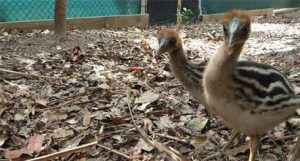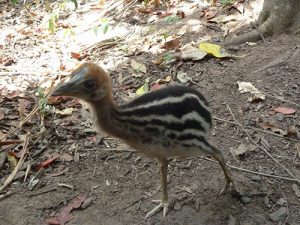Caring for Cassowary Chicks
Rainforest Rescue is caring for three orphan cassowary chicks at Garners Beach Cassowary Rehabilitation Recovery Centre. This facility is managed under a partnership with the Qld Department of Environment and Protection (DEHP).

Two of the chicks have been in care since 11 October when they were found wandering down a road in south Mission Beach without their father. It is believed he was killed in a dog attack. The third chick came into care on 16 November when it was approx. one month old after being struck by a vehicle in Etty Bay.
The chick was initially unable to walk, and was found to have a fractured tailbone. Under the care of EHP rangers and the Tully Vets its condition improved steadily and it is now able to walk, and has been transferred to the Centre for ongoing care. All three chicks are steadily improving and their appetite is growing daily!
It is expected that Rainforest Rescue will be caring for the cassowary chicks at the Centre for approximately 12 months before they can be returned to the wild.

How to ensure they maintain their wild behaviour
To ensure a successful release into the wild, it is essential that human contact be minimised during their rehabilitation process. Very young chicks may need some initial close observation to ensure they are feeding. For their safety, they also may require manual handling to secure them in an evening enclosure away from nocturnal predators (pythons etc).
Once they are past the juvenile stage, the only handling will be for veterinarian treatment. All human contact will be as brief as possible; avoiding non-essential entry to the enclosures other than for maintenance. To ensure wild traits are maintained, fresh food is scattered in small piles in different locations throughout the enclosure and each day these locations differ. This ensures the cassowary does not become dependent on or comfortable with human contact.
These chicks represent the future of the endangered southern cassowary population
All costs associated with rearing and rehabilitating these chicks (and all birds taken into care at the Centre) is funded by Rainforest Rescue – this includes food, vet bills, carer costs and the Centre’s maintenance.
Want more good Rainforest news in your life?
Subscribe to our eNews | Follow us on Instagram | Like us on Facebook | Subscribe to our YouTube channel
Help Protect Rainforests Forever
Donate to Protect Rainforests Forever | Become a Rainforest Guardian for as little as $2 a month | Partnership Options

